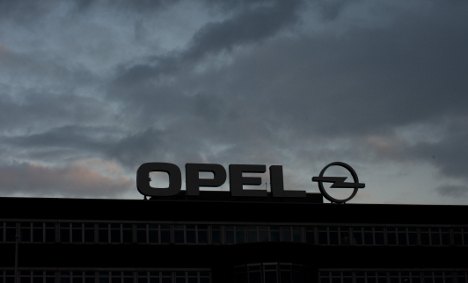Opel To Pull Plug On Astra Production In Rsselsheim

After a lot of talk, GM is beginning to create facts at Opel: The production of Opel’s volume model, the Astra, will be moved from Rüsselsheim to Opel/Vauxhall sites in Ellesmere Port and Gliwice, Poland. This according to reports in Germany’s Frankfurter Allgemeine Zeitung, which receives usually reliable information from Opel’s unions.
The union informants of the FAZ say that the decision will be announced in a few weeks. Their information is from Steve Girsky. Girsky heads Opel’s Supervisory Board where the unions have half of the seats.\
With more than 300,000 units made per year, the Astra is (next to the Corsa) Opel’s most important model. A decision to move its production elsewhere is devastating, a union member told the Frankfurt paper. “It is as if the Volkswagen Golf would no longer be built in Wolfsburg,” the informant said. One third of Rüsselsheim’s production capacity is currently used to make the Astra, says the FAZ
The move is planned for 2015, when the new generation of the Astra will be launched. In the same year, the agreement expires that until then prohibits firings or plant closures.
An Opel spokesman had no comment and referred to ongoing discussions. According to Der Spiegel, Opel CEO Stracke implicitly confirmed the story by praising Rüsselsheim’s importance for the production of the Opel Insignia.
Vis-a-vis the Wall Street Journal, GM later confirmed that it presented the strategy for the upcoming compact-car generation to its labor unions. Stracke said in a statement:
“After finalizing an information and consultation process with European labor representatives the company will decide at which plants the next Astra generation will be produced from 2015 on.”
Hat tip to the mountain man.

Bertel Schmitt comes back to journalism after taking a 35 year break in advertising and marketing. He ran and owned advertising agencies in Duesseldorf, Germany, and New York City. Volkswagen A.G. was Bertel's most important corporate account. Schmitt's advertising and marketing career touched many corners of the industry with a special focus on automotive products and services. Since 2004, he lives in Japan and China with his wife <a href="http://www.tomokoandbertel.com"> Tomoko </a>. Bertel Schmitt is a founding board member of the <a href="http://www.offshoresuperseries.com"> Offshore Super Series </a>, an American offshore powerboat racing organization. He is co-owner of the racing team Typhoon.
More by Bertel Schmitt
Latest Car Reviews
Read moreLatest Product Reviews
Read moreRecent Comments
- El scotto They should be supping with a very, very long spoon.
- El scotto [list=1][*]Please make an EV that's not butt-ugly. Not Jaguar gorgeous but Buick handsome will do.[/*][*] For all the golf cart dudes: A Tesla S in Plaid mode will be the fastest ride you'll ever take.[/*][*]We have actual EV owners posting on here. Just calmly stated facts and real world experience. This always seems to bring out those who would argue math.[/*][/list=1]For some people an EV will never do, too far out in the country, taking trips where an EV will need recharged, etc. If you own a home and can charge overnight an EV makes perfect sense. You're refueling while you're sleeping.My condo association is allowing owners to install chargers. You have to pay all of the owners of the parking spaces the new electric service will cross. Suggested fee is 100$ and the one getting a charger pays all the legal and filing fees. I held out for a bottle of 30 year old single malt.Perhaps high end apartments will feature reserved parking spaces with chargers in the future. Until then non home owners are relying on public charge and one of my neighbors is in IT and he charges at work. It's call a perk.I don't see company owned delivery vehicles that are EV's. The USPS and the smiley boxes should be the 1st to do this. Nor are any of our mega car dealerships doing this and but of course advertising this fact.I think a great many of the EV haters haven't came to the self-actualization that no one really cares what you drive. I can respect and appreciate what you drive but if I was pushed to answer, no I really don't care what you drive. Before everyone goes into umbrage over my last sentence, I still like cars. Especially yours.I have heated tiles in my bathroom and my kitchen. The two places you're most likely to be barefoot. An EV may fall into to the one less thing to mess with for many people.Macallan for those who were wondering.
- EBFlex The way things look in the next 5-10 years no. There are no breakthroughs in battery technology coming, the charging infrastructure is essentially nonexistent, and the price of entry is still way too high.As soon as an EV can meet the bar set by ICE in range, refueling times, and price it will take off.
- Jalop1991 Way to bury the lead. "Toyota to offer two EVs in the states"!
- Jalop1991 I'm sorry, Dave. I'm afraid I can't do that.


































Comments
Join the conversation
Disastra for Rüsselsheim.
If this story is true, and I sincerely hope it is, then this will have many positive effects. 1. The UK retains a car manufacturing plant with an increased output and huge scope for export. This is crucial because the UK are trying to export our way out of recession and if Ellesmere Port were to close, that would be a huge blow to that plan. Since September 2008, people in the UK are starting to re-learn the value and benefits of manufacturing & engineering and looking at "financial engineers" with an air of derision. Again, if Ellesmere Port closed that might have undermined that new paradigm. 2. It actually sends a sharp lesson to continental Europe. Many people in the UK (myself included) are utterly sick to death about hearing how plants, prices and labour on the Continent are "so much more efficient" than hoary, old United Kingdom. They casually gloss over how many things are actually subsidised to keep their prices low. Sometimes subsidised by the UK themselves! A good example of this is electricity prices. In France, EdF and GDF Suez are majority state owned and the government dictates to them how much energy prices can rise, so if prices naturally rise by, say, 9% and the government says you can only charge the French customers 4%, then tough! Swallow the cost. This means someone has to take up the financial slack. So in the UK, where EdF and GDF Suez also operate, the UK have a free market policy, so they can charge whatever prices they like, so it's a good opportunity to rip foreign customers off in order to subsidise the French ones. So, effectively plants in France get an advantage (in one aspect) that UK plants don't. I suppose what I'm saying is the message to continental Europe is "If you want to play the 'Free market' game, play by the rules." 3. Another message it sends to Europe, is that efficient plants are valued. If GM, for example, were to shut its most efficient plant in Europe, what kind of message does that send to the other plants? "Hey, lads! We can be as slow as we like and doesn't matter! It's who lobbies hardest." Europe can't work like that anymore. We need to have the most efficient plants, not just in Europe, but in the world. And in the UK, Ellesmere Port in GM's most efficient plant in Europe and Nissan Sunderland is Nissan's most efficient plant in Europe and one of Nissan's most efficient plants, globally. Toyota's Burnaston plant is also considered to be a very tight operation, too. Toyota Japan are shipping the Toyota Avensis to Japan for sale. Japanese customers are very particular about their quality and Toyota would not ship a substandard product to one of its key markets. We in the UK can run efficient operations, it's just that it counts for nothing if production will also shift to Europe because of the expense of closing a continental plant. Hopefully, this will help shift that way of thinking. If this story turns out to be true, then maybe Europe will realise they can't keep putting inflexible labour laws to prevent plant closures. If efficiency and quality become the metrics by which European plants compete on, then you watch the UK become the "motor city" of Europe... P.S. If you actually read this post from start to finish, then you have more patience for waffling then I do! :O)